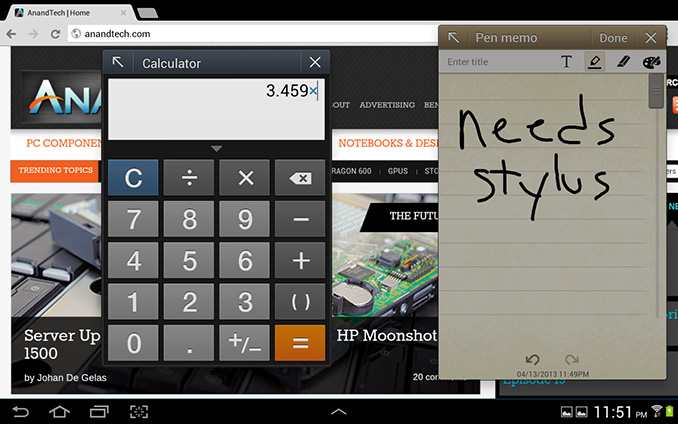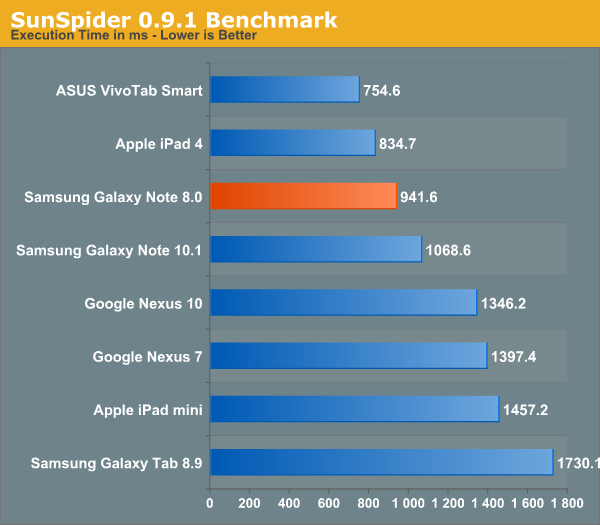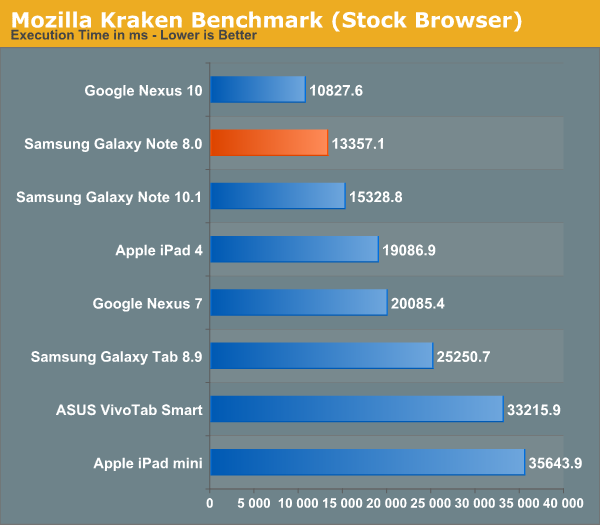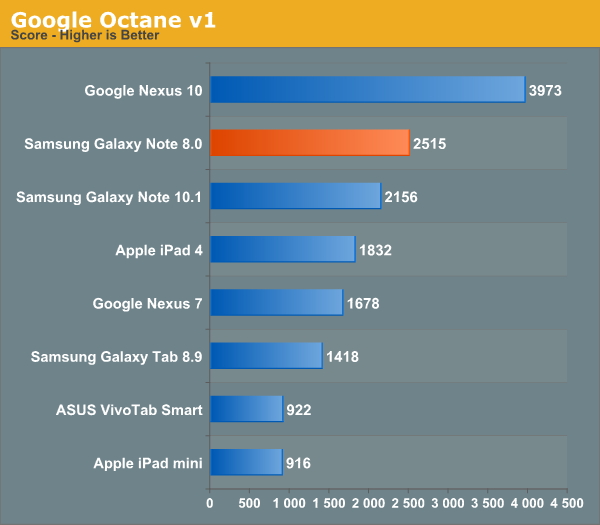Samsung Galaxy Note 8.0 Review
by Anand Lal Shimpi on April 17, 2013 11:29 PM EST- Posted in
- Tablets
- Samsung
- Android
- Mobile
- Galaxy Note 8.0
Performance: Upgrading from a Galaxy Tab 8.9
It’s important to remember that users actually upgrade devices and aren’t in a constant state of comparing only the absolute latest to the absolute latest. Stepping into the real world for a moment, I dusted off the first sub-10” tablet that ever excited me: Samsung’s Galaxy Tab 8.9.
Built around NVIDIA’s Tegra 2 and driving an 8.9-inch 1280 x 800 display, the Galaxy Tab 8.9 was in many ways a not too distant relative of the Note 8.0. Many of the UI customizations we see today on the Note 8.0 can be seen in a much earlier form on the Galaxy Tab 8.9. The app drawer existed back then (although it was seriously slow to appear/animate) and the tablet eventually got the ability to display multiple apps at the same time:

Multitasking on the old Galaxy Tab 8.9
There was even an early note taking app although the old Galaxy Tab 8.9 lacked a stylus.
From a performance standpoint, it’s sort of insane to think of how far we’ve come in such a short period of time. Remember, the Galaxy Tab 8.9 came out less than 2 years ago. Back then, shipping 40nm LP hardware from TSMC was common place - we've gone through a full process node transition since. Building SoCs at 28/32nm not only gave manufacturers the ability to integrate more features (more cores, bigger GPUs), but at higher frequencies as well.
CPU Performance
The Galaxy Note 8.0 features Samsung's own Exynos 4 Quad (4412) SoC. The SoC features four ARM Cortex A9 cores running at up to 1.6GHz (1.4GHz max in the Note 10.1) fed by a 1MB L2 cache and a dual-channel LPDDR2/3 memory controller. ARM's Cortex A9 isn't exactly top shelf these days, but compared to what's in the iPad mini (2 x A9s running at 1GHz) the Note 8.0 has a substantial frequency advantage. The same is true if we look at the Note 8.0 compared to the old Galaxy Tab 8.9. The advantage there is even greater as Tegra 2 lacked NEON support and only had a single channel memory interface.

The Note 8.0 a bit faster than the Note 10.1 thanks to its higher max CPU frequency (1.6GHz vs. 1.4GHz). The comparison to the Galaxy Tab 8.9 is like night and day, the Note 8.0 is considerably quicker. The iPad mini comparison is also skewed significantly in favor of the Note 8.0. Using Apple's A5r2, the iPad mini still has a standard Cortex A9 based SoC with a much lower operating frequency than what's used in the Note. This chart alone is good reason for why Apple needs to move the mini to an A6 based design sooner rather than later.

The Note 8.0's CPU performance remains very competitive here despite being based on a fairly old CPU architecture at this point. The 8 is much faster than the iPad mini, tangibly quicker than the Nexus 7 (dual-channel memory interface, higher max CPU clocks) and in this case even faster than the iPad 4 thanks to the performance of Chrome on Android.

Our final CPU/js test echoes what we've seen elsewhere. Samsung knows how to build performance competitive hardware. The improvement over the old Galaxy Tab 8.9 remains significant.










95 Comments
View All Comments
herts_joatmon - Friday, April 19, 2013 - link
You could always root this, under clock and undervolt the CPU thus giving you Nexus 7 level performance and improved battery life. I also assume that the Wacom digitizer tech used in this uses additional electricity meaning that if it was applied to the Nexus 7, you would probably get reduced battery life anywayHisDivineOrder - Thursday, April 18, 2013 - link
The reason Samsung is doing a sea of niches is because they've got the advantage of a huge manufacturing infrastructure they can rely on to do it and do it well. They intend to drown Apple in an ocean of different products at different sizes and specs, bombarding the consumer in so much product there's little chance they haven't made something better for you in an Android variety.Poor Apple. They aren't destined to win this one. They're going to be shoved back into that niche box by the end and a big part of the reason will be Samsung, their ex-partner they burned with lawsuits and price bickering. Another large part of the reason will be the fact that Apple seems to be tapped out on new ideas or innovative styling.
Now everything's just, "Thinner, silverer, black/white-er." They're like fans of a dead man who can't appreciate anything new because of a blind devotion to the rapidly decaying chic of the dearly departed.
nerd1 - Friday, April 19, 2013 - link
Samsung has some advantage over other OEMs, but not over apple. BOM of apple products are always much cheaper, and they are enjoying double the margin of others.Mercadian - Thursday, April 18, 2013 - link
Hi Anand,Why have you stopped benchmarking mobile SoCs with Epic Citadel? I remember you did a great job with iPhone 4S review.
Jumangi - Thursday, April 18, 2013 - link
I don't know why Samsung thinks this thing is worth $400. I'm not the biggest Apple fan but at that price I would just buy the iPad.herts_joatmon - Friday, April 19, 2013 - link
Look up the price of a wacom tablet. then add that price to the iPad to get a comparable price. This is a modern tablet and graphics tablet in one The ipad is just a modern tablet.nerd1 - Friday, April 19, 2013 - link
iPad users are actually paying $100 to get JOT stylus to get a half-baked pressure sensitivity...SuperSuperChicken - Friday, April 19, 2013 - link
"If you’re the type of person to value, polish and take care of the things you own, the Note 8’s construction doesn’t convey luxury. If you want something you’re not going to feel bad about tossing about like you would your keys or a bag, maybe a plastic tablet is less of a problem."I see this a lot on Anandtech lately, with the phone reviews and now this. The insinuation is that if I don't want a metal-cased device, then automatically I'm one that doesn't care about the condition of my devices or how they look, which is simply not true.
Now, I'm no fan of glossy plastic, I would have hoped the manufacturers would have moved away from it by now. However, I am a fan of plastic and prefer it over metal devices such as the iPad due to the fact that in the real world, I can actually hold onto a plastic device whereas the metal ones tend to slip through my fingers. I think the Nexus 7 is a nice looking device, but even I'm not foolish enough to argue that it looks better than the iPad. However, when I have to encase the iPad in a cover in order to be able to hold it, it seems the point is moot.
I appreciate quality materials, however, in my case it doesn't take precedence over practicality. With plastic bodies, I can run my phone and tablet without cases, keeping them slim as designed - which is something metal bodied devices wouldn't be able to offer. I just ask that you keep that perspective in mind and don't just assume that everyone who has a plastic-bodied device doesn't care how it looks and is want to mistreat them.
nerd1 - Friday, April 19, 2013 - link
I see lots of plastic cases for metal phones - I wonder why nobody makes a metal case for plastic phones.SuperSuperChicken - Friday, April 19, 2013 - link
Companies do, actually (search for "metal case galaxy s3"). I'm not sure how much I'd trust them not to degrade reception though.